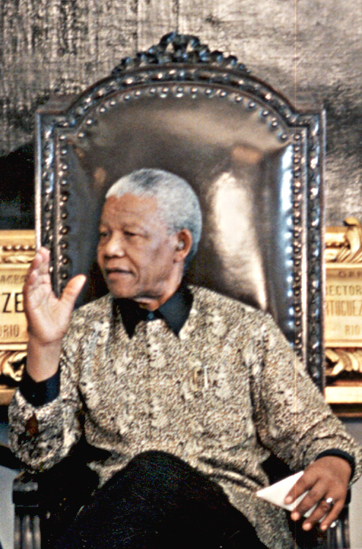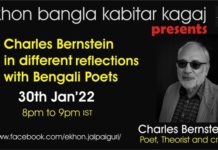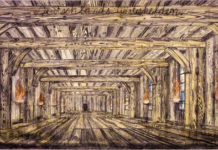The Mandela Enigma
by Wlad Godzich
_
 Nelson Mandela has been an enigma to me. I have read his autobiography and many of his speeches, listened to him on tape, and watched him on television, all the time wondering how someone becomes Nelson Mandela. Jean-Paul Sartre explained how Gustave became Flaubert because of his early identification as “the idiot in the family,” but it took him three volumes and thousands of pages, and he still left the job unfinished. Most accounts of the great figures of history focus on their sense of self and their sense of mission. Mahatma Ghandi, who is often invoked in discussions of Mandela, provides the best example of such an account: the epiphany on the train in South Africa, when he understands the nature of racial and political oppression and his growing sense of being endowed with a spiritual mission to carry out political liberation. The lives of these figures seem to fit preexisting narratives and allow us to consider them with equanimity since they comfort our expectations, exceeding them only in magnitude but not in nature or scope.
Nelson Mandela has been an enigma to me. I have read his autobiography and many of his speeches, listened to him on tape, and watched him on television, all the time wondering how someone becomes Nelson Mandela. Jean-Paul Sartre explained how Gustave became Flaubert because of his early identification as “the idiot in the family,” but it took him three volumes and thousands of pages, and he still left the job unfinished. Most accounts of the great figures of history focus on their sense of self and their sense of mission. Mahatma Ghandi, who is often invoked in discussions of Mandela, provides the best example of such an account: the epiphany on the train in South Africa, when he understands the nature of racial and political oppression and his growing sense of being endowed with a spiritual mission to carry out political liberation. The lives of these figures seem to fit preexisting narratives and allow us to consider them with equanimity since they comfort our expectations, exceeding them only in magnitude but not in nature or scope.
This is not the case with Mandela. To be sure, he starts out with a pretty good pedigree as a member of a royal family, but he is the product of a morganatic union and thus cannot inherit any titles, privileges, or honors. There is no evidence that he resented this status, or rather the lack of it, and it would be unwarranted speculation to suggest that he derived a sense of justice or an ambition to affirm his value from it. If anything, the evidence points to the fact that he was comfortable with his standing in the family, retaining his links to it and returning to it even in death.
So what made him tick? And even more important, what made him the outstanding figure he became? Determinists who assert that the actor matters far less than the agent, and that the latter’s agency derives from a conjunction of forces, would find it difficult to maintain their clever distinction. Their approach is based on the assumption that anyone else thrust in the same situation would do as well differing only in idiosyncratic ways. Even the most stubborn of them would find it impossible to equate Mandela with the featureless “anyone” of their equations.
This leaves us with the oldest differentiating factor of all in discussions of exceptional figures: character. Character evokes notions of honor, will, integrity, moral rectitude, strength, resolve, steadfastness, courage, fidelity, and so on. It would not be too difficult to sketch a portrait of Mandela by combining these traits and adding a few more personal ones, such as his sense of humor or his patience. Other aspects would be more difficult to include: his undeniable spirituality devoid of any appeal to Providence or any other transcendental.
The invocation of character may be satisfying, but it may also mask a deeper problem. Mandela at no time displayed two features associated with character: amour propre, self-interest and self-possession. He was not selfless; he was indifferent to the notion of the self. A telling exchange occurred between him and a journalist who charged him with inconsistency when he failed to publicly condemn the Burmese junta whom he had earlier excoriated for its treatment of political prisoners and specifically Aung San Suu Kyi: “That was prisoner Mandela,” he replied. “But this is President Mandela. And President Mandela is a prisoner of the Office of the President.” What is remarkable about this reply is that the author of The Long Walk to Freedom continues to consider himself a prisoner. His actions and statements are constrained now as they were then, in fact perhaps even more now than they were then. Mandela is not engaging in casuistry here; he is telling us about his relationship to history.
There is no reference to self, or its current political sound-bite version, “core values.” The constant prisoner status is a contingent condition, and the possibilities inherent in it, though limited, are further constrained by other contingencies. Mandela was giving the journalist a lesson in reading: read your circumstances, and if you apply some intelligence to this action, you will be capable of the type of discernment that makes action possible.
Intelligence, reading, and discernment are, in my view, the keys to Mandela’s enigma, and to his uniqueness.




[…] “Mandela’s Reflections: Meditations and Interventions from the boundary 2 Collective.” […]